 Petzlover
Petzlover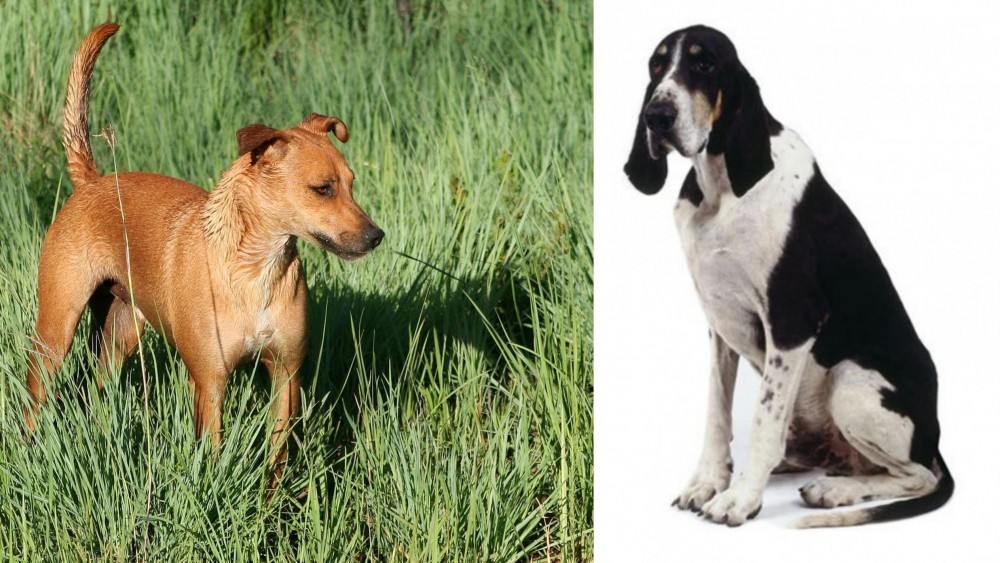 Africanis is originated from South Africa but Grand Anglo-Francais Blanc et Noir is originated from France. Africanis may grow 12 cm / 4 inches shorter than Grand Anglo-Francais Blanc et Noir. Africanis may weigh 13 kg / 29 pounds more than Grand Anglo-Francais Blanc et Noir. Both Africanis and Grand Anglo-Francais Blanc et Noir has same life span. Both Africanis and Grand Anglo-Francais Blanc et Noir has almost same litter size. Africanis requires Low Maintenance. But Grand Anglo-Francais Blanc et Noir requires Moderate Maintenance
Africanis is originated from South Africa but Grand Anglo-Francais Blanc et Noir is originated from France. Africanis may grow 12 cm / 4 inches shorter than Grand Anglo-Francais Blanc et Noir. Africanis may weigh 13 kg / 29 pounds more than Grand Anglo-Francais Blanc et Noir. Both Africanis and Grand Anglo-Francais Blanc et Noir has same life span. Both Africanis and Grand Anglo-Francais Blanc et Noir has almost same litter size. Africanis requires Low Maintenance. But Grand Anglo-Francais Blanc et Noir requires Moderate Maintenance
 Africanis is one of the original African breeds. This breed was not shaped by humans, but they went through the process of natural selection. Humans did not affect this breed by standard breeding practices. Through the history, this breed became stronger and stronger because only the strongest of the breed survived. Africanis descent is the early dog that is originally from ancient Egypt. Approximately 4500 BC was the period of first data about this breed.
Africanis is one of the original African breeds. This breed was not shaped by humans, but they went through the process of natural selection. Humans did not affect this breed by standard breeding practices. Through the history, this breed became stronger and stronger because only the strongest of the breed survived. Africanis descent is the early dog that is originally from ancient Egypt. Approximately 4500 BC was the period of first data about this breed.
As time passes through, Africanis became more and more popular through the whole continent. This breed migrated with people for thousands of years, and now, a modern Africanis is similar to Greyhound dog. The original Africanis can be found in tribes and more traditional people. One of the oldest breeds in the world is one of the lasts that has been recognized by Kennel Union of Southern Africa.
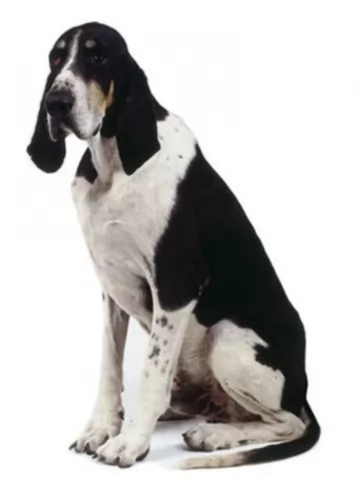 Known also as the Great Anglo-Francais, White and Black Hound or the Grand Anglo, the Francais Blanc et Noir is one of several breeds of hounds.
Known also as the Great Anglo-Francais, White and Black Hound or the Grand Anglo, the Francais Blanc et Noir is one of several breeds of hounds.
The dog was bred by crossing French scenthounds with English Foxhounds.The Grand Anglo-Français Blanc et Noir has always been used for hunting. As a scenthound, hunting was always done in packs and he thrilled at the chase.
The large dog originates in France and is recognized by the French Kennel Club as well as the Federation Cynologique Internationale.The purpose of this breed standard is to provide guidelines for breeders wishing to maintain the quality of their breed, but to also improve it.
 Africanis origins from South Africa. The average Africanis weights 25-45 kg, with a height of 50-60cm, while females are slightly smaller. They are medium sized dogs who are friendly, but also independent and territorial. They can are good pets for training, but it requires persistent work.
Africanis origins from South Africa. The average Africanis weights 25-45 kg, with a height of 50-60cm, while females are slightly smaller. They are medium sized dogs who are friendly, but also independent and territorial. They can are good pets for training, but it requires persistent work.
The lifespan of Africans is 10-12 years, but lifespan always depends on health, genetics, and care of the dog. Therefore, if they are healthy and well cared they can live longer than average.
Litter Size variates a lot, so female can have 2-8 puppies.
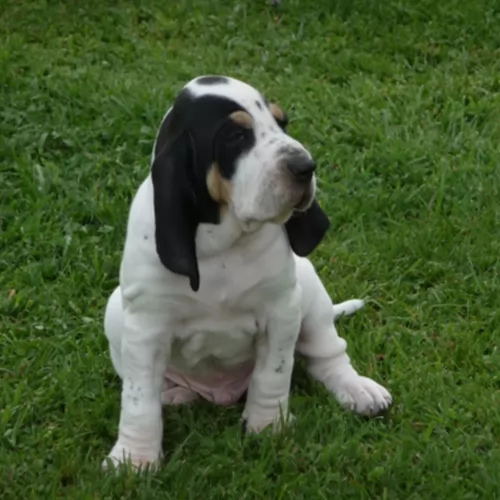 The Grand Anglo – Francais Blanc et Noir is a big, powerful dog standing at 62 – 72cm and weighing 27 - 32kg. His chest is broad and deep.
The Grand Anglo – Francais Blanc et Noir is a big, powerful dog standing at 62 – 72cm and weighing 27 - 32kg. His chest is broad and deep.
The head is flat and broad, the nose black with gentle looking brown eyes. The coat is short and dense for protection and the coloring is black and white. There is a tan dot above each eye. The ears are floppy. The tail is long and tapers down to a slender point.
As a superb hunting dog, this breed lives for the hunt and loves nothing more than to be chasing its prey. The dog has an excellent sense of smell and can track prey in all kinds of terrain.
Although the dog has a stable temperament, he isn’t recommended as being kept solely as a pet, even though he is gentle with children. Maybe its because he has a more serious personality and would prefer to live with active, sport-loving adults than having to contend with the antics of children.
He also isn’t the best dog to have around other small pets as he is so prey-driven he may well be aggressive towards them.
He isn’t a city-loving dog and with his high energy levels he is best suited to properties with large gardens or to farm life. While he will bark and alert you to strangers, he won’t make a particularly good watchdog as he isn’t aggressive.
 Africanis is a very good and healthy breed. They are very intelligent and friendly breed. They are not an aggressive breed, but they tend to protect the master. Africanis is a natural guard dog. This breed is used to being alone because for the centuries they migrated close to humans, but they also have been independent.
Africanis is a very good and healthy breed. They are very intelligent and friendly breed. They are not an aggressive breed, but they tend to protect the master. Africanis is a natural guard dog. This breed is used to being alone because for the centuries they migrated close to humans, but they also have been independent.
Training Africanis is not very hard. They tend to learn very quickly. Positive training with awards is the best way to train your Africanis. The old-fashioned way of training dogs with punishment is not recommendable for Africanis. They are intelligent breed who requires patience and constancy.
They are very good with other animals too, but they need proper socialization. Africanis requires daily exercise so if you keep your dog in the apartment it should have few daily walks. Africanis can live in the apartments though.
Overall, they are very healthy breed, so with regular vet checks and proper care, they are perfect pets for the whole family since they are great and gentle with small children and kids.
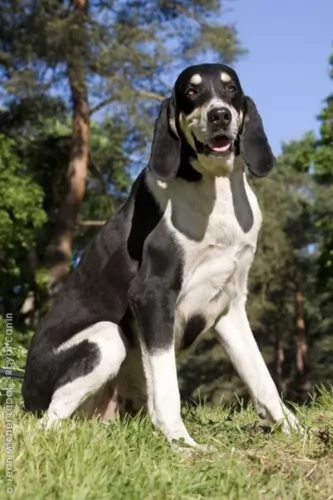 Essentially known as a pack dog, the Grand Anglo-Français Blanc et Noir isn’t going to do well with anyone who lazes on the couch all day.
Essentially known as a pack dog, the Grand Anglo-Français Blanc et Noir isn’t going to do well with anyone who lazes on the couch all day.
He is energetic and driven, and will develop all kinds of behavioral issues if not properly and adequately exercised.
Fitting into a household where hunting is part of the lifestyle will be ideal for him, loving the outdoors and the stimulation that comes from hunting with other dogs.
Provide him with an outdoorsy, active owner and this hunting dog will ensure that he is your loyal and loving companion.
 The great thing about Africanis is that this breed is very healthy. Thousands of years of evolution made this breed one of the toughest breeds in the world. They can survive very tough conditions. Africanis has a very healthy immune system too. It evolves so strong that there are no internal or external parasites that can harm the dog.
The great thing about Africanis is that this breed is very healthy. Thousands of years of evolution made this breed one of the toughest breeds in the world. They can survive very tough conditions. Africanis has a very healthy immune system too. It evolves so strong that there are no internal or external parasites that can harm the dog.
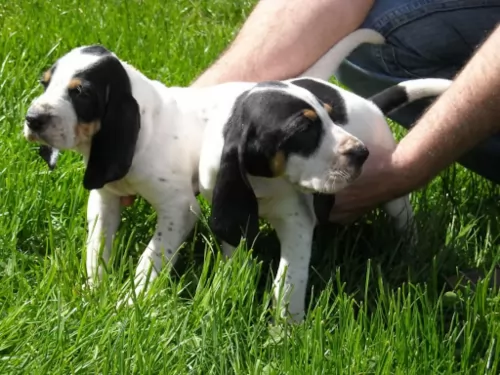 Capable of reaching 10 to 12 years of age when looked after well, there aren’t any specific health issues with this dog. He is likely to experience one or two issues that other dogs have to contend with as well.
Capable of reaching 10 to 12 years of age when looked after well, there aren’t any specific health issues with this dog. He is likely to experience one or two issues that other dogs have to contend with as well.
There are one or two diseases that you want to be aware of -
This dog has long, floppy ears and this means that air doesn’t reach inside the ears properly. He is therefore prone to ear infections. After he has been swimming, dry his ears gently inside.
Unfortunately this is a disease that can strike even when your Grand Anglo-Francais Blanc et Noir is a puppy. Hips which aren’t formed properly can cause stiffness, pain and lameness in your pet.
 Africanis has used to eat everything, so this breed does not require any special treatments. 2-2.5 cups of dry high-quality food would be more than enough to have healthy and well feed the dog. But have in mind that feeding the dog depends on daily activity and size. If the dog is more active, an extra cup wouldn’t be a problem for a dog to eat.
Africanis has used to eat everything, so this breed does not require any special treatments. 2-2.5 cups of dry high-quality food would be more than enough to have healthy and well feed the dog. But have in mind that feeding the dog depends on daily activity and size. If the dog is more active, an extra cup wouldn’t be a problem for a dog to eat.
Africanis puppy should eat more times per day than an adult dog. 3-5 meals per day of quality dry food are good measure to feed your puppy Africanis.
Since Africanis has short hair they are very easy to groom and care. Few brushes on a weekly basis with occasional bathing would be more than enough to have a clean and healthy dog.
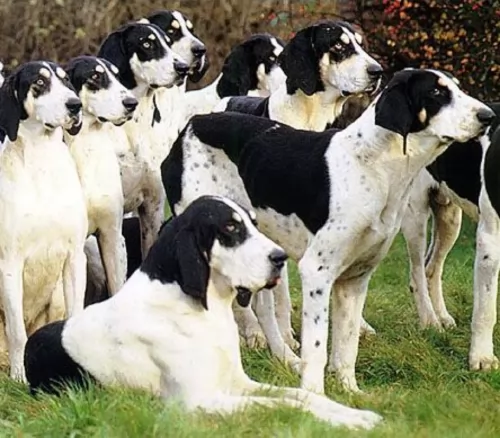 With his short coat and being an average shedder, the Grand Anglo-Francais Blanc et Noir is an easy dog to groom, requiring a brush twice a week.
With his short coat and being an average shedder, the Grand Anglo-Francais Blanc et Noir is an easy dog to groom, requiring a brush twice a week.
Check his ears inside and out, particularly if he goes swimming. Excess moisture in the ear can encourage bacteria and ear infections. See that his nails are trimmed and remember to check his teeth for dental disease which can cause ill health generally.
As a hunting dog, he will need a good deal of exercise. He won’t be content to just go for a walk once a day, but will want something more hectic such as joining you as you go hiking, cycling, swimming or jogging.
As a scenthound, your Grand Anglo – Francais Blanc et Noir is always out and about sniffing around looking for a tasty treat, but with these active dogs, the secret is to small, frequent meals as apposed to 1 or 2 large meals.
It is important to see he gets a nutritionally complete balanced diet that gives him slow release energy. Check with your vet if you’re unsure what to feed him. You want to avoid foods high in fillers, colorants and preservatives.
There are some excellent commercially manufactured dog foods for high energy dog,s but make sure to go for the best brands. You can mix his kibble with some raw meat occasionally and also give him cooked brown rice, chicken and vegetables. He’ll need a constant supply of fresh, cool water.